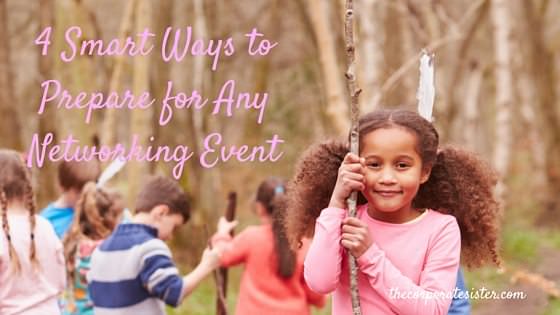 Yesterday, I dropped off Dear Daughter at her first day of camp, ever. As I dropped her off, I could sense she was a bit nervous. She had no idea what to expect, and frankly, neither did I. After we did the preliminary registration on-site, she was off on her own. I watched her from the car walk alone to a corner and sit all by herself. Typical case of networking 101, the 7 year-old version…
Yesterday, I dropped off Dear Daughter at her first day of camp, ever. As I dropped her off, I could sense she was a bit nervous. She had no idea what to expect, and frankly, neither did I. After we did the preliminary registration on-site, she was off on her own. I watched her from the car walk alone to a corner and sit all by herself. Typical case of networking 101, the 7 year-old version…
As I drove off that day, I couldn’t help but think how we learn very early on to avoid networking situations. Whether on the playground, at the party, or in the meeting room, how we approach networking situations at 7 or 77 years old ends up following pretty much the same rules.
As an introvert, I know how the concept of networking can sometimes feel like a mix of breaking in hives and eating fat-free ice cream. The mere thought of meeting a bunch of new people you’ve never seen, and actually having full conversations with them, can make anyone want to reach out for full-fat sea salt caramel ice cream. Unless you’re willing to put in a bit of work, prepare and handle each networking event as an opportunity to better yourself, expand your horizons and grow your brand…
Here are 3 tips to help you get prepared for any and all of your networking events:
OWN YOUR MESSAGE
The point of networking is to share your message and receive others’ messages as well. Yet for this, you have to intimately know what it is you’re bringing to the table. I used to go to networking events with no clear picture of my strengths, and the opportunities I was seeking. While I got to meet a lot of interesting people, I still missed out on leveraging these encounters and turning them into more fruitful relationships, whether personal or business-wise.
Prepare your own elevator pitch that captures your message, and that you can quickly present to any contact you make. Are you looking to grow your business? Or are you interested in making connections with your peers of the same industry? Are you a great writer, an innovative researcher, or the champion for a cause? What are your interests and strengths? What opportunities are you looking for? When these questions are unanswered in your own mind, you end up networking without a purpose. And while you can still make great connections, your impact as a result is lessened.
HAVE A MENTAL DISCUSSION LAUNDRY LIST
I’m not a “small talk” kinda gal. I like intentional, meaningful conversations. Yet in networking settings where you very often meet people for the first time, conversation starters are a must. Finding topics to discuss other than the usual “What do you do?”, or “Where did you go to school?” was always a bit of a challenge. While I didn’t want to dive in headfirst into weather talk, I still had to find a way to start and at times maintain the conversation. So I made up my own…
If you’re not into small talk yet would like to show up to networking events prepared to build meaningful connections, prepare ahead of time your own laundry list of topics to discuss based on your own interests. If you’re into fashion, why not pay the person you’re speaking with a compliment and ask about their style at work or in their business as a conversation starter or filler. Or you can bypass the weather talk and instead ask about someone’s personal interests outside of work, the kind of sports they play, or their favorite TV shows. Not only do these help you know (and remember people more), it also helps breaking the “networking ice” without having to repeat 10 times over how nice the weather has been lately…
DO YOUR NETWORKING DUE DILIGENCE
One of the very first networking events I attended ended up being a disaster, as I showed up at a different location first. I had no idea what the topic would be and who’d be in attendance. I was still in college, and the whole experience left me with a sour “networking” taste in my mouth. Since then, I learnt to do what one of my mentors calls your “networking due diligence” before each and every networking event.
That includes a few quick, yet necessary checks before the big day:
- Knowing the location of the event (and if it’s a particularly important networking event, actually going there beforehand to make sure);
- Checking the list of attendees at the event (if you can’t access a guest list, the alternative is to come in early and ask the organizers who will be in attendance);
- Printing and bringing business cards, if you’re planning on distributing any;
- Bring a spare name tag (in case something happens and yours isn’t available or lost).
HAVE A FOLLOW-UP PLAN
While you may think the event itself is the most important part of networking, the follow-up part actually determines if it was a success or not. Hence the importance of tracking the contacts you made in the process. You can do this by asking for a business card, or at least an email address. Having a system to organize these contacts at home is also a great way to keep track of your new connections. I personally use a “networking spreadsheet”, where I organize contacts by industry and field.
In addition to systematically and strategically storing your networking contacts, having a follow-up plan is also crucial. Whether it’s following them on Linked In, or sending them a quick email, or both, have an approach to continue the relationship you started. And if you can make your approach as personalized as possible, like sending an email reflecting your brand, business, or company, even better…
How do you prepare for networking events?
PS: Like this post? Get my FREE networking gift below:
To Your Success,
The Corporate Sis.







